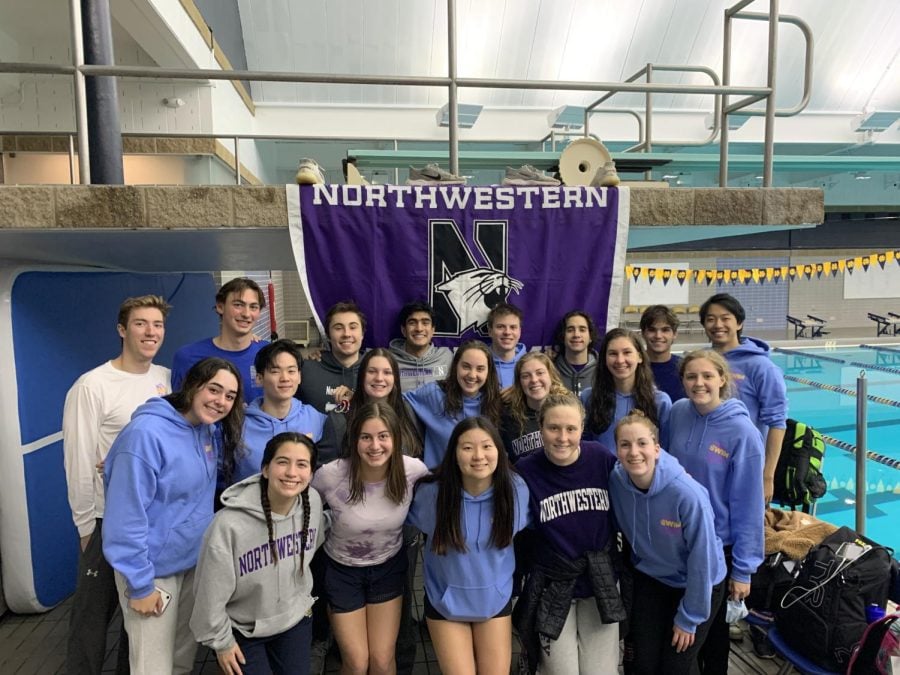Club sports teams regain a sense of normalcy with fewer COVID-19 restrictions
Club swim’s membership by the pool.
April 3, 2022
Over the past two years, Northwestern club sports teams have dealt with season cancellations, limited contact, masking mandates and other inconveniences caused by the pandemic.
In the 2021-22 academic year, however, many club sports team members say loosened COVID-19 restrictions have brought a sense of normalcy with more competitions against other schools and enriched connections between teammates.
Water polo player and Weinberg freshman Theo Faugeres said although health-related and logistical challenges have forced the team to adapt, they made significant progress through the reintroduction of intercollegiate tournaments.
“Up until the fall, the school wouldn’t let us play teams that weren’t fully vaccinated, so we were in a tight spot. We ended up not playing a single Big Ten team, and we reorganized our games around teams that were fully vaccinated,” said Faugeres. “This quarter, we’re back in the Big Ten and we’re finally allowed to host home tournaments.”
At NU, approximately 1,200 unique athletes participate in 38 club sports annually, according to NU Recreation data from 2015. Club sports at the University include options like ice hockey, track, field hockey and taekwondo.
The University initially halted all club sports and closed its recreational facilities for the 2019-20 academic year on March 13, 2020. Club sports resumed for limited activity the following school year though with masking and distancing protocols in place as well as no intercollegiate competition.
Medill junior and Women’s Crew Captain Andrea Hancock said not being able to practice in person for almost all of her first two years with the team was mentally and physically challenging. She said the crew team was where she made some of her closest friends, but it’s harder to build those relationships remotely.
“A big part of the sport is you’re in a boat with a bunch of other people, and so that’s really motivating to keep going because they rely on you and when you remove that aspect of it, it’s tough,” Hancock said. “We tried to do some social events over Zoom and that was really the extent of the team’s operation.”
The 2021-22 school year began with fewer restrictive protocols, though indoor masking was still required.
After a nationwide outbreak of the Omicron variant in December 2021, the University issued a mandatory Wildcat Wellness quarantine period for the first two weeks of Winter Quarter.
Weinberg freshman William Wang, who is on the club swim team, said the two-week suspension of team activities during Wildcat Wellness impacted the team’s preparation for meets.
“We host our own home meet once a year and that happens to be a month after Winter Quarter starts, so Wildcat Wellness really cut into our recovery time,” said Wang. “We could go to our own practices and book our own times at the pool, which you can do with a couple friends, but it’s not the same as going to a practice.”
The University lifted the indoor mask mandate Feb. 28 for non-classroom spaces, and there are now virtually no official restrictions on masking or distancing for both indoor and outdoor activities. Wang said these changes will help reestablish some of the intimacy and chemistry club teams enjoyed before the pandemic.
“I think in terms of practice itself, it’s fully gone back to normal,” Wang said. “Everybody comes and shows up. People still wear masks in the pool area, which is fine and that’s all completely optional, but everything is mostly back to normal, which is actually pretty crazy to say.”
Club athletes, however, are not completely satisfied with their current situations. The pandemic amplified and exacerbated many long-standing challenges to club sports, such as inadequate funding and a lack of communication with the University.
Teams at other colleges around the country, including The George Washington University and Williams College, have also reported a lack of institutional funding and access to practice space during the pandemic.
Hancock said the crew team has been repeatedly forced to move its indoor practice locations and has encountered financial issues – problems that stand out in contrast to the treatment of NU’s varsity sports.
“Obviously I understand that some of the varsity athletes perform in sports that bring in revenue for the university, but it’s really tough,” Hancock said. “ There’s a lot of money that we have to rely on donors and participants for. That’s something that I wish the University could help us more with.”
Email: lucaskim2025@u.northwestern.edu
Related Stories:
— Northwestern’s club sports pause activities during Wildcat Wellness
— Club sports return to Northwestern following COVID-19 hiatus
— Men’s club rugby stays motivated and optimistic during the pandemic


